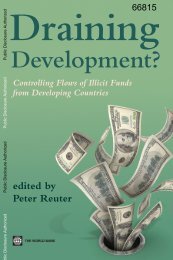rural-urban dynamics_report.pdf - Khazar University
rural-urban dynamics_report.pdf - Khazar University
rural-urban dynamics_report.pdf - Khazar University
You also want an ePaper? Increase the reach of your titles
YUMPU automatically turns print PDFs into web optimized ePapers that Google loves.
GLOBAL MONITORING REPORT 2013 RURAL-URBAN DISPARITIES AND DYNAMICS 99<br />
BOX 2.3 Water in Africa: Strong public sector leadership is key to sustainable PPPs in<br />
<strong>rural</strong> and small towns<br />
Public-Private Partnerships (PPPs) in nontraditional<br />
markets. Nontraditional markets, such as those in<br />
sparsely populated and dispersed settlements, present<br />
a challenge to making private sector participation a<br />
commercially viable proposition because of economies<br />
of scale and affordability issues. The experiences<br />
of Cambodia, Mali, Mozambique, the Philippines,<br />
Rwanda, Senegal, and Uganda have shown, however,<br />
that given the right allocation of risks among<br />
participants in the PPP, interest can be generated in<br />
the private sector. In many African countries, the<br />
private sector’s role is mostly confined to operating<br />
<strong>rural</strong> water supply schemes, and generally small<br />
piped water schemes, serving households through a<br />
combination of private connections and standpipes.<br />
In India, the private sector is involved in higher<br />
value-added services, such as processing and disposal<br />
of solid waste. Success comes not just by helping<br />
develop PPP arrangements but also by strengthening<br />
the enabling legal, regulatory, financial, and<br />
institutional environment. In Sub-Saharan Africa, a<br />
number of governments have explicit policies for the<br />
delegation of water supply services to private operators,<br />
as in Benin, Burkina Faso, Mali, Mauritania,<br />
Mozambique, Niger, Rwanda, Senegal, and Uganda.<br />
Lease and management contracts are the most common<br />
types of contract today, whereby operators take<br />
commercial and operational responsibility, including<br />
for small repairs.<br />
Key lessons from the field: Financial viability suggests<br />
the need to lower the cost of services in <strong>rural</strong> areas to<br />
drive consumption. Evidence suggests that a growing<br />
number of privately operated schemes are just able to<br />
achieve operating cost recovery, with a few making<br />
comfortable margins. What separates financial winners<br />
and losers? Analysis in Uganda found that the<br />
number of active connections was a strong positive<br />
determinant of financial cost recovery. More active<br />
connections translate to higher volumes of water sold,<br />
given that consumption tends to be higher from private<br />
house connections than standpipes. This observation<br />
captures the common issues across countries:<br />
the price of water and connections, rates of consumption,<br />
and economies of scale. In <strong>rural</strong> growth centers<br />
outside of small towns, the cost of service tends to be<br />
higher than in <strong>urban</strong> areas. Lowering the cost of service<br />
requires approaches that are usually not easy to<br />
coordinate or navigate politically and hence, they are<br />
typically not undertaken. These include subsidizing<br />
the densification of standpipes to bring them closer to<br />
household settlements or subsidizing the cost of house<br />
connections; and clustering schemes across different<br />
political/administrative boundaries to be managed by<br />
a single operator.<br />
Holding local institutions accountable matters for the<br />
success of the partnership and for rehabilitation. Private<br />
sector participation in Africa is often an accompaniment<br />
to political devolution, which saw the<br />
responsibility for water services decentralized to the<br />
local level. This is the case in Benin, Burkina Faso,<br />
Mali, and Uganda. The role of local governments as<br />
the focal point between the state, consumers, and the<br />
private sector is critical. Often, however, transfer of<br />
authority for water services is incomplete and not<br />
well thought out. Uganda is unique as it has set up a<br />
dedicated and autonomous local body that represents<br />
the public sector in water services delivery. In contrast,<br />
most West African countries, such as Benin and<br />
Burkina Faso, expect the local communes (mayors) to<br />
take on oversight for water services as an additional<br />
mandate.<br />
Source: Water and Sanitation Program, http://www.wsp<br />
.org/topics.<br />
Agglomeration economies arise when<br />
there is a confluence of people, or population<br />
density, and firms, or economic density. The<br />
main outcome is the creation of jobs, which<br />
are central to poverty reduction and reaching<br />
MDG 1. According to the World Development<br />
Report 2013: Jobs (WDR 2013), in<br />
26 countries across all regions, more than<br />
50 percent of the reduction in poverty can<br />
be attributed to an increase in labor income<br />
(World Bank 2013).<br />
Higher economic and population densities<br />
of <strong>urban</strong> areas are also good for governments.<br />
They generate tax revenues that are essential

















